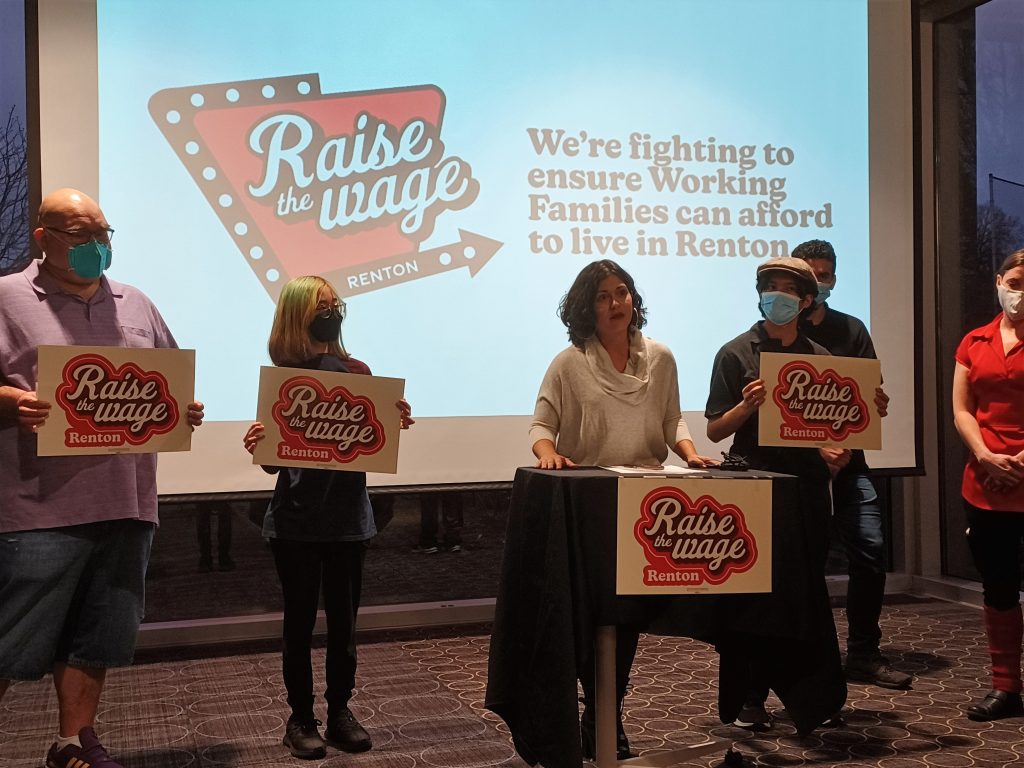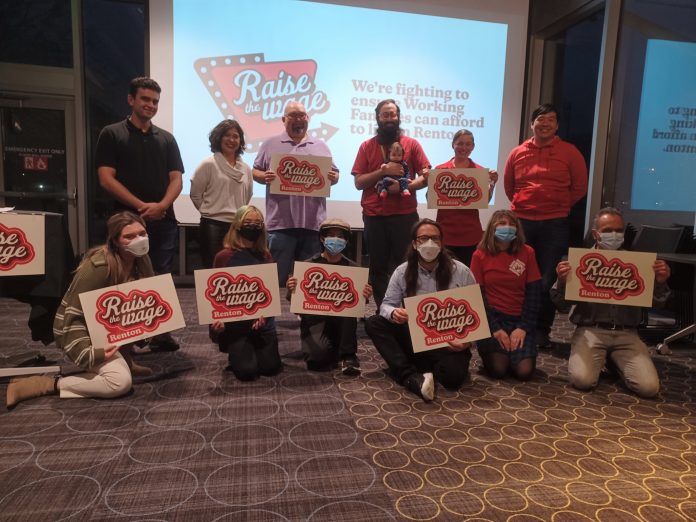Hot off the coattails of a resounding electoral victory to raise the minimum wage in Tukwila, a new coalition has formed to launch a similar ballot initiative campaign in Renton. Dubbed “Raise the Wage Renton,” chief organizer Guillermo Zazueta announced the campaign’s launch alongside students, workers, and elected officials at Renton Downtown Library on Wednesday evening. The measure would peg Renton’s minimum wage to match that of both Tukwila and SeaTac, currently around $19 per hour, and include annual adjustments for inflation.
If the coalition can collect approximately 8,800 valid signatures from Renton residents and the measure can pass with a simple majority on the November 2023 ballot, the higher wage would come into effect for the city’s largest employers on July 1, 2024. Businesses with fewer than 15 employees would be exempt from the ordinance, and employers with between 15 and 500 total employees (counting workers that are outside of Renton) would have a two-year phase-in period.
The measure would also require covered employers to prioritize giving available work hours to existing part-time employees over hiring new workers, and it would forbid retaliation against employees who make claims or inquiries about potential violations of the ordinance.
“The overall message that we want to deliver here to voters, the media, and the community is that we want to make sure that working families in Renton can afford to live in Renton,” Zazueta said. “We want to deliver the message that ensuring good wages and working conditions will continue to set the standard for the entire region.”
During the pandemic, housing price increases have been particularly steep in suburban areas, especially in formerly moderately priced areas like Renton. In 2019, the average home price in Renton was still under $500,000. Today that figure has surpassed $740,000 according to Zillow — a nearly 50% increase in just three years. Wages certainly haven’t climbed that quickly, which has put owning a home further out of reach for many working class families. Landlords have also seized on the trend to jack up rents.
The regional standard that the campaign attempts to set is based heavily on the foundation that was laid last year in Tukwila. In nearly all aspects, the text of the measure is a carbon-copy of the legislation spearheaded by Transit Riders Union that passed with over 82% support in that city’s November election. For the Renton initiative, Seattle Democratic Socialists of America (DSA) is the main group that has lent its resources and organizational infrastructure by setting up a Political Action Committee (PAC) and conducting initial organizing work in the city.

Comments from Michael Westgard, a Renton worker and Shop Steward with SEIU Local 925, were strongly rooted in anti-capitalist analysis.
“From the growing unhoused population to longer lines at food banks, the people are struggling because of stagnant wages and uncontrolled rent increases,” Westgard said. “Because of attacks on organized labor and political inaction during the neoliberal economic period, workers and the systematically-oppressed have been left behind and bear the brunt of suffering from the unregulated takeover of the economy by tech companies, the exploitation of manufacturing workers in the Global South, and just-in-time logistics.”
He continued with a notice to elected officials: “If you won’t raise wages, working people will.”
At least two officials have heard the message — both Renton City Councilmember Carmen Rivera and State Senator Bob Hasegawa (D-Renton) lent their endorsements for the campaign at Wednesday’s press conference. Councilmember Rivera in particular had strong comments for her executive counterpart, Renton Mayor Armondo Pavone, whom she urged to place a minimum wage ordinance on the Council’s agenda.
“A lot of this can actually be avoided if our mayor, Mayor Pavone, would just put this on the agenda and have the Council vote for it. We could avoid all of this — we could blow Tukwila out of the water — by not having it be a ballot measure, but having it be a Council measure that we vote on, which I would greatly encourage.”
In a response to a request for comment by The Urbanist, Pavone stopped short of endorsing the measure outright, saying, “I can say, in practice and philosophically, that I support higher hourly wages for employees. There are many considerations: affordable housing, workforce development, and training infrastructure, transit and transportation, equity for small minority- and women-owned businesses, and more. I’m proud of the forward-reaching work we as a city have done thus far on protecting workers and tackling issues around housing affordability. Along with the Renton City Council, I remain committed to searching for progressive and effective policies that address the needs of our Renton residents and support the economic health of our community. I look forward to continuing this discussion in the months ahead.”
That discussion could continue as soon as tonight, as Councilmember Rivera urged press conference attendees to show up and testify in support of Council action on the city’s minimum wage. Passage by the City Council of such an ordinance would still require a majority of the seven members’ support, which is not guaranteed. Renton Council President Valerie O’Halloran did not respond to The Urbanist’s request for comment.
Although the campaign for a ballot initiative will be heavily based around an approach already battle-tested in a neighboring city, Zazueta acknowledged that organizers in Renton will face unique challenges. While the Tukwila campaign experienced no organized opposition from local employers like Southcenter Mall, Renton’s larger size and multiple employment centers create more opportunities for large business interests to oppose the campaign, according to Zazueta. However, organizers like Renton high schooler and PAC board member Bailey Medilo seem unconcerned.
“Our message to [large employers] is that we invite them to the conversation, and we would love to hear their thoughts and cooperate with them to raise the minimum wage and improve material conditions for Renton residents,” Medilo said. “If you truly care about Renton workers, then you will back our initiative.”
While running a successful grassroots campaign to raise the minimum wage may have seemed like a tall order three months ago, Tukwila’s success suggests public support is on the side of organizers. That momentum may be hard to stop not just in Renton, but regionwide.
Chris Randels is the founder and director of Complete Streets Bellevue, an advocacy organization looking to make it easier for people to get around Bellevue without a car. Chris lived in the Lake Hills neighborhood for nearly a decade and cares about reducing emissions and improving safety in the Eastside's largest city.



